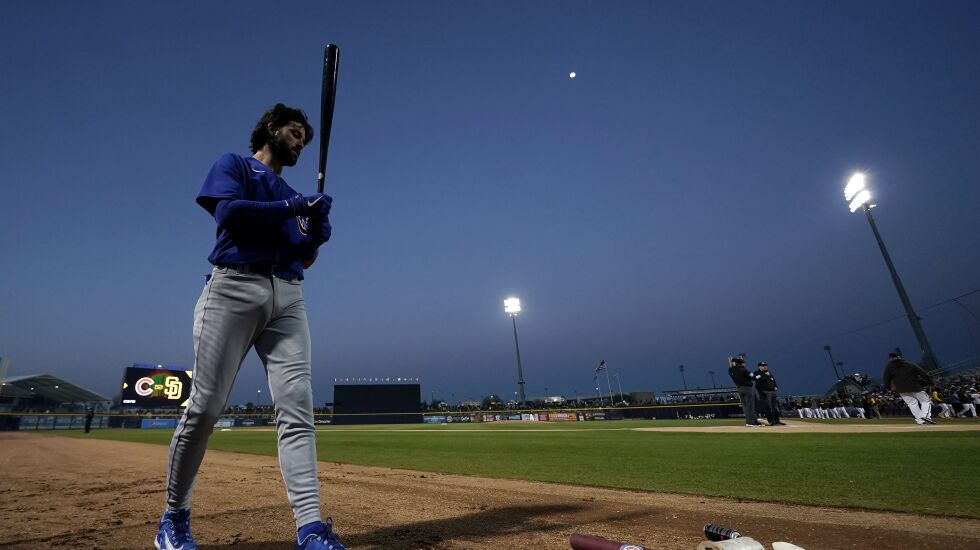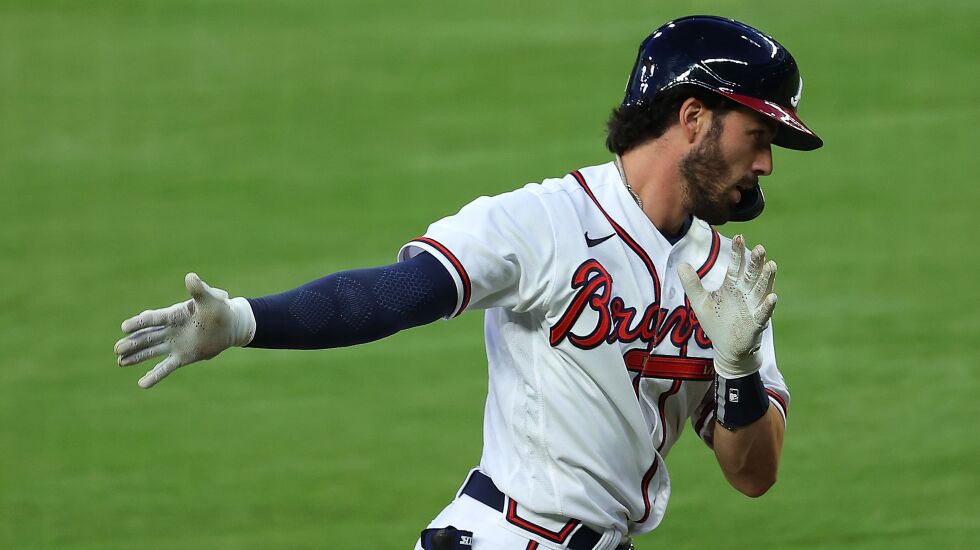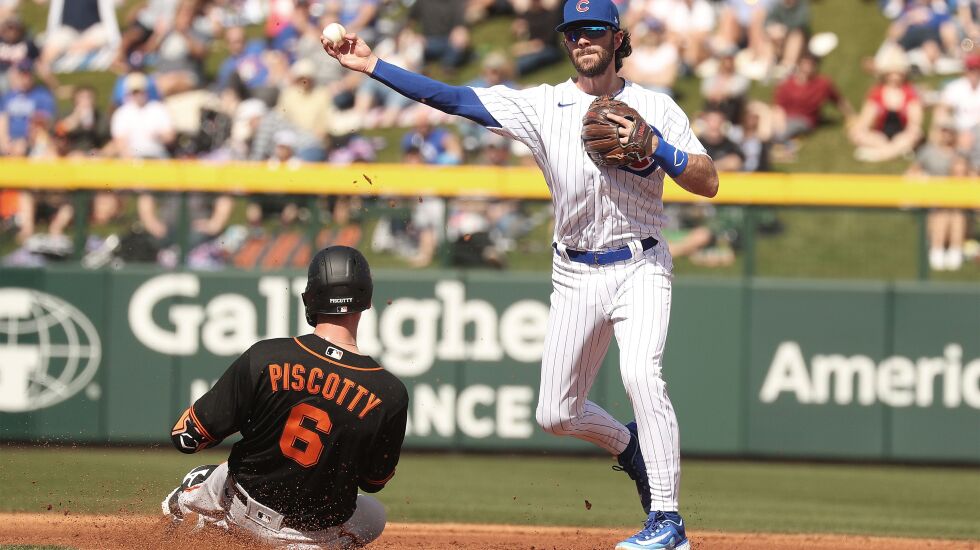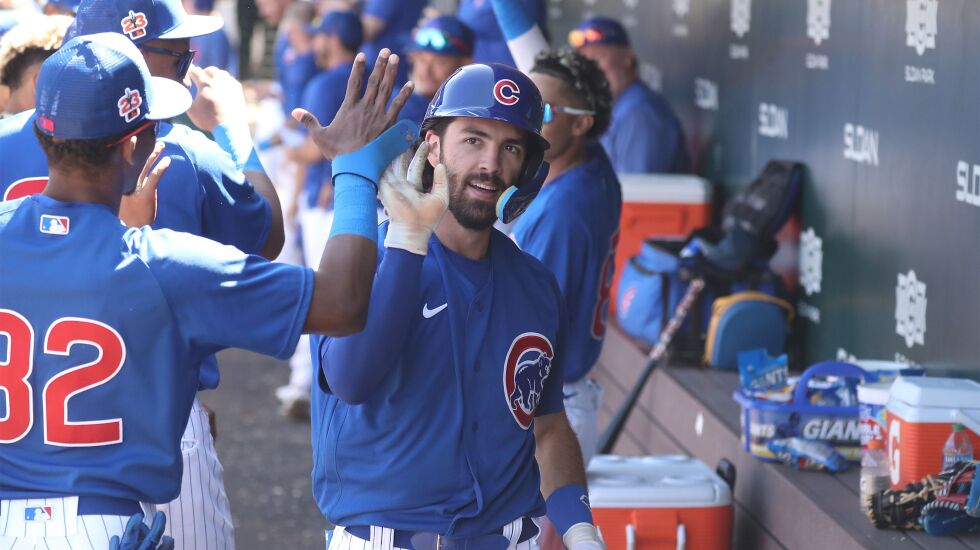
If there was one thing Dansby Swanson just plain couldn’t do as a college player at Vanderbilt, it was grab some bench — by which we simply mean sitting down in the dugout during a game, taking a load off, preserving some of the energy his baseball-loving dad, Cooter, worried was being unnecessarily spent.
“You need to keep some of that for yourself,” Cooter would advise him.
But that wasn’t Swanson’s way; never had been and, quite likely, never will be. The game, any game, simply was — is — too important not to be receiving his finest effort and full-on engagement, of which encouraging, cajoling and congratulating teammates always have been vital components. At Vandy, it could have been an early-season one-off against Eastern Illinois, a midseason series against a fellow SEC powerhouse or a national-championship series against Virginia; it didn’t matter who was in the opposing dugout. In his, Swanson was up and about and always, after a Commodore crossed home plate with a run, waiting on the top step.
“I’ll bet you anything you’ll see it the first time [a fellow Cub] homers this season,” Cooter says. “He gets so much pleasure from that.”
In a broader sense, Swanson is on the top step like never before in his baseball life. After signing for seven years and $177 million in December, the shortstop instantly became the new face of the Cubs, the key piece of their latest rebuild and the player whose own successes and failures will most directly inform the legacies of president of baseball operations Jed Hoyer and his crew.
This is exactly as Swanson wants it. He felt called by God to Chicago and to lead the Cubs with his fervent best, which he expresses publicly with such clear-eyed seriousness that fans and media will hold him to it. And they certainly will hold him to comments like this:
“In everything I do — it doesn’t matter what it is — I win,” he says. “That’s my separating factor. Everything I do is to win, and that’s as simple as it gets.”
Every opinion of Swanson’s time on the North Side will be formed, of course, from here on out. But to better understand the 29-year-old from Kennesaw, Georgia, going in, why not grab some bench, take a load off and learn some things about the baseball player he always has been?
The first step toward stardom
Swanson was 5 years old when the video “Superstar Shortstops” was released, and by 6 he was watching it on almost an endless loop. It mesmerized the boy as it played on the VCR in the rear of Cooter’s custom van, featuring the work of legends Honus Wagner, Phil Rizzuto, Luis Aparicio and Ernie Banks and more recent stars such as Ozzie Smith, Barry Larkin, Omar Vizquel and Derek Jeter — and also Nomar Garciaparra, who was Swanson’s absolute favorite.
How they moved, the decisiveness and ease with which they manned the most important position in any infield, the way their preparedness and instincts blended as one — all of it was like a torchlight to a wick inside Swanson’s little noggin.
“It kind of ran my imagination wild in terms of the possibilities and who I wanted to become as a player,” he says. “You get molded by the things you see when you’re such a kid. I just loved it, loved the diving plays and learning about what the position of shortstop meant. It’s more than being athletic; it’s knowing the game at a deeper level than anybody else. It’s about leading, it’s about captaining, it’s truly like the center of the field, in the middle of everything. I took responsibility for that at a very young age.”
Swanson watched it “easily over 100 times,” he says, though his parents put it more in the ballpark of 1,000. Eventually — technology changing, but “Shortstops” still holding up magically — mom Nancy put it on a flash drive for Swanson, who has watched it more than once since reaching the big leagues.
“It brings back so much nostalgia,” he says.
Great is great. Great is timeless.
Little brother, little big shot
Playing shortstop for the Express at age 7 and 8, Swanson built challenges into a game that came so much easier to him than it did to his nascent peers. Imagining himself on the diamond at Turner Field, then home of the Braves, he would creep toward second base before pitches in hopes a batter would pull a ball into the hole to his right. Sound baseball strategy? Not whatsoever. But all he wanted to do — and he was the only player his age who could do it — was range like a cat to his right, backhand the ball while sliding, pop up and fire it across the infield for a bang-bang out at first.
Just like the greats did it.
Parents would “ooh” and “aah,” which, naturally, made both Cooter and the Express’ head coach — Nancy — warm over with pride. And if they were there, Chase and Lindsey, 9 and 7 years older, respectively, than their brother, would smile knowing they’d had a hand in it, too.
Nancy Dansby played basketball and tennis at Troy University and is a Hall of Famer at the school. Cooter was a baseball standout and later an assistant coach there. Chase became a middle infielder at Mercer and Lindsey a Division II shortstop at Georgia College. Little Dansby — whose real first name is James — was influenced by them all in substantial measure.

“He was going to see his brother and sister play since he was in a stroller,” Cooter says.
When Lindsey was in middle school, she often played what she called “pepper” with Dansby, which amounted to her whacking balls as hard and far as she could and her dutiful, tireless brother scampering after them.
“I will always tell everyone I taught Dansby everything he knows,” she says with a laugh.
When Chase was 16, Dansby — slick beyond his years — took grounders with the older boys at every practice.
“Essentially, to get to stay out there and to not embarrass myself, I had to get good early,” Swanson says. “I had to get good and stay good at a young age because I was around high schoolers. I’m competitive. I’m not going to be the guy who makes everything look bad.”
Lindsey, now a licensed psychologist who provides sports psychology services to athletes of all ages, recognized Dansby’s deep desire to be creative in the field — especially with the slide and pop-up, which today he calls his “signature move” — and encouraged him to take it further.
“It was not showing off,” she says. “It was legit how he wanted — needed — to play the game.”
Later on, most often with Nancy, Dansby would be a spectator at Lindsey’s college games. And by “spectator,” we mean he’d bring his glove and one for his mom and insist she throw him, oh, a million or so grounders and pop-ups alongside the back of the dugout, pausing only, if he had his way, to watch Lindsey hit.
“He would get mad at our mom for stopping,” Lindsey says, “but I think he absorbed everything that happened. He probably -remembers more about my games than I do because his memory for sports is phenomenal.”
He was lucky to have a big sister and big brother who enjoyed having him around.
“They were amazing,” he says. “Or maybe I was a cool kid? I don’t know. No, my brother and sister were awesome, so loving and caring. I was so young, I just wanted to be like them. Very simple — I wanted to be like them.”
Pop flies and ‘Sock’ flies
“People always ask me, ‘Why are you so good and comfortable catching balls hit over your head?’ ” Swanson says. “I tell them, ‘That’s all I did growing up.’ ”
There’s an origin story for that, too.
When Dansby was 8, Cooter brought home a portable pitching machine, dragged it into the yard and rigged it to shoot baseballs high and deep into the sky. Before this, Swanson was “relentless,” as Cooter puts it, about asking his parents and siblings to throw him pop-ups. But these ones from the machine were next-level, and Swanson would crouch at the ready, picturing himself as Garciaparra or Jeter, before turning on a dime and sprinting with abandon as he tracked the balls’ majestic flights.
“He would do it for hours,” Cooter says. “It was absolutely one of his favorite things to do.”
Does Swanson really connect his tremendous skill in this facet of the game to those long-ago hours and that rickety contraption?
“Absolutely,” he says. “I’ve done it a kajillion times in my life. I was obsessed with it. I was obsessed in, like, a fun way with playing the game. I just loved it. I still do, obviously, but it’s kind of good to be reminded of this — of how important it is to be childlike when you play.”
Which brings us to “Sockball,” a game concocted by the Swanson siblings and played — to the occasional horror of Nancy — inside the house. The tool of destruction was a souvenir wooden bat, slightly larger than the miniature ones occasionally given away at ballparks. The path around the “bases” led to a recliner (first), then around the back of the smaller couch to an end table (second), then around to the far end of the larger couch (third) and finally to a precious space right in front of the TV (home). Sliding into home was expected, if not required. Outs were recorded by pegging the runner with the ball — a rolled-up sock, but you probably guessed that already — before he or she reached the next base.
The noise was outrageous, and it would feel like the whole house was shaking. Learned the hard way: the need to pull all the picture frames off the walls before play began.
“My mom was amazing with kind of allowing us to tear up the living room,” Swanson says.
If Chase and Lindsey outgrew the game, they were kind enough not to let on to their baby brother, who kept the Braves’ lineup in his head as he hit, imitating Chipper Jones, Gary Sheffield, Vinny Castilla and the rest. Such sweet, innocent fun.
“Our family is just amazing,” Swanson says, “top to bottom.”
Getting back on the good foot
Swanson’s parents recall him pitching at 9 years old in a travel tournament at Disney’s Wide World of Sports Complex outside Orlando, Florida, on a fiendishly hot day. His face so red that Nancy became concerned, he was bound and determined to stay out there and kept throwing harder and harder. On a good team, he still clearly was the best player.
In middle school, however, many of his baseball peers — among them current Angels first baseman Jared Walsh — matured sooner physically, and in eighth grade, for the first time, Swanson didn’t make his travel club’s top team. Instead, he played for Cooter on essentially the B team, which, impressively, also included future major-leaguers Travis Bergen and Skye Bolt.
“A lot of his friends were just bigger and stronger,” Cooter says, “so our team was basically Dansby and a bunch of other little guys. I think that set a fire in them, especially Dansby. He knew the more mature guys didn’t have to work as hard as he did to be successful, and he wanted to work hard. I think that gave him an edge.”

It would take Swanson a few years to catch up in the size and strength departments, but he became a technician, especially in all areas of footwork in the field and on the basepaths. Back at home and pursuing her master’s degree, Lindsey spent a lot of time with her brother and could sense his confidence was billowing and he was on the verge of becoming a great player. Vanderbilt coach Tim Corbin began to come around and would need to watch Dansby play five or six games to get the full picture. In the end, though, he was wowed — vindication for Swanson, even if the future Commodore didn’t view it as such.
“Even at 13, 14, 15, 16, I would still say in my heart that I was better [than all his peers] at the game of baseball,” Swanson says. “I just wasn’t physically mature enough to keep up, but it didn’t even matter to me. The only thing that mattered was — and maybe this is why I’m still this way — I just knew I needed to keep getting better. I knew I’d get there.”
Jumping through hoops
Another thing that arguably impeded Swanson’s baseball ascent was basketball. He loved Duke sharpshooter JJ Redick almost as much as Garciaparra and, at times, playing basketball even more than playing baseball. Throughout high school, when most of the area’s top baseball prospects were playing year-round, Swanson went back and forth between the sports. He captained the Marietta basketball team — named the Blue Devils, in case you were wondering why Redick — for two seasons and drained 171 three-point shots as a varsity guard.
Swanson had more fun in basketball team practices than he did in baseball ones, which could get monotonous. On some level, he also knew hoops wasn’t as serious; though he daydreamed about playing college basketball, it wasn’t as if he was soaring up the ranks as a prospect. That appealed to him, too. It was a typical high school sports experience — and a respite of sorts — and such a positive one, he was innately certain that giving it up would be a mistake.
“I basically got told I wouldn’t get anywhere in baseball if I didn’t stop playing basketball,” he says, “but I needed that time just to enjoy myself.”
The basketball court has continued to be a haven ever since. On the emotionally charged 2015 night when he found out the Diamondbacks had traded him to the Braves six months after making him the No. 1 pick in the draft, he ended up alone in a gym shooting baskets until the lights went down. And though he no longer plays in full-court games due to the injury risk, he still works NBA combine-style drills — with an emphasis on shooting — into his offseason training regimen. Why? Because he believes it helps, in a similar manner to cross training, with his overall athleticism. But also because it’s fun as heck.
He claims to be a 60% three-point shooter with no one guarding him, for those of you scoring at home.
And someday, he hopes, he’ll have kids who play baseball and basketball, too. Or any other combinations of sports, really. OK, fine, soccer probably is pretty much locked in as one of them. Wife Mallory Swanson — star forward for the Red Stars and a prominent member of the U.S. national team — also was a hooper and views her own second-sport experience similarly.
The point is: “You should definitely play more than one sport,” Swanson says.
And there you have it.
Rejection and redemption
The most fun Swanson has ever had playing baseball was at Vandy, and not only because the Commodores reached the national championship series in back-to-back seasons, winning all the marbles in 2014, with Swanson being named most outstanding player of the College World Series.
“College was pretty amazing,” he says, “the perfect culmination of everything being about winning, enjoying the sport and the game itself. College really is, like, the time of your life. Your worries are very small, you know what I mean?”
With the Diamondbacks, Swanson knew the stakes were enormously elevated and viewed the organization as a family and his relationship with it as a sacred bond. He was a D-back to the core, though he harbored a fantasy in a corner of his mind about someday retiring with the Braves. Being traded was a gut shot, and he was deeply hurt and offended.
“Betrayal,” he says now. “I’m a very loyal person, something that kind of runs in the Swanson DNA.”
He’d left Vanderbilt early and briefly thought about re-enrolling.
“I more or less got convinced to leave school,” he says, “and felt like I put all my trust and loyalty into an organization with a vision to build something for the future and to win. You get sold on a vision like that — that’s so much my core and heart — it felt, in a way, like that decision was taken away from me. I didn’t understand it, didn’t like it, hated every bit of it.”
He found out while at dinner with his then-girlfriend and called his parents a couple of hours later.
“Did you see?” he asked Cooter.
“Yeah,” he heard back.
“All right,” he said. “Bye.”
Cooter and Nancy’s boy was coming home, a seeming dream come true. Instead, they felt his pain.
“Dansby is a leader and an incredibly loyal person, and that’s what they said they wanted,” Cooter says. “They said he’d retire a D-back. It was bad.”

The “best and worst thing,” as Swanson phrases it, happened in 2016 — he was called up to the Show. Only 22, he played well for the last month and a half of the season. Almost instantly, his face was on billboards and city buses. He was a hometown hero, and he reveled in it. And then he tanked in 2017.
“I’m 22, playing well in the big leagues, have some money — life couldn’t have gotten any better, right?” he says. “But you just live how you would imagine a 22-year-old would. Looking back, why was I such an idiot?
“But I also say I wouldn’t be the man I am now if I didn’t go through that. Because in 2017, I was probably the worst player in baseball, and I got torn down to the point of [being] humbled and surrendering. I built my faith back up. If I didn’t get to that point, I never would have met my wife and we would have never gotten connected the way we did. All things happen for a reason.”
The Atlanta years eventually got better, much better. The Braves won it all in 2021. Swanson was an All-Star and won a Gold Glove in 2022, positioning himself for the windfall he got from the Cubs.
And now he’s on the top step. He’s in his element.
“It’s so natural,” he says. “I want to be connected with teammates. I want my teammates to feel it.”
They will feel it, and the Cubs will win. Swanson is as sure of it as he has been about anything in his baseball life. Take a load off? Maybe after the championship parade.







